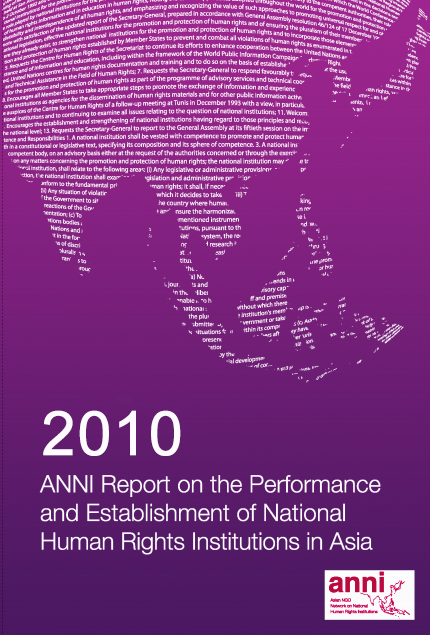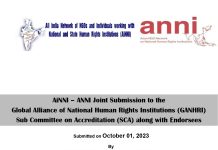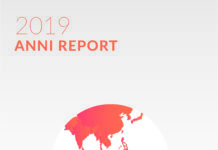An Unwavering Struggle for
Independent and Effective NHRIs
Emerlynne Gil, ANNI Coordinator
The Year in Context

In 2009, the role of national human rights institutions (NHRIs)
in fostering a culture of human rights promotion and protection
in Asia appeared to become clearer to human rights movements
across the region. There are also indications that Asian NHRIs are
starting to recognize this role, as clearly illustrated in the steps taken
by the four NHRIs from Southeast Asia (Thailand, Philippines,
Malaysia, and Indonesia) in the process of the establishment of
the ASEAN Inter-governmental Commission on Human Rights
(AICHR). These NHRIs took on a proactive role of trying to
ensure that international human rights principles are reflected
in the AICHR’s terms of reference. Moreover, the International
Coordinating Committee (ICC), the international grouping of
NHRIs, also vigorously called on ASEAN member states to ensure
the independence of this newly-established regional human rights
body so that it may be able to effectively discharge its mandate of
promoting and protecting human rights in the region.
The year under review was also significant as this was when
the Asian NGOs Network on National Human Rights Institutions
(ANNI) focused on encouraging fellow human rights defenders
on the ground and various human rights movements at the
national level to work for the development and establishment
of independent, effective, transparent, and accountable NHRIs.
In India, for instance, People’s Watch (PW) held a series of
consultations and discussion groups among local and grassroots
human rights defenders, spreading the word about the importance
of assessing and monitoring the work of the NHRI. In Thailand,
the Working Group for Justice and Peace (WGJP) translated the
their report on the National Human Rights Commission (NHRC)
of Thailand from the previous year into the local language so that
more human rights defenders on the ground are able to access it
and use it in their work. The WGJP also co-sponsored a launch of
this translation where it the Chairperson of the NHRC of Thailand
to speak to local groups about her plans for the Commission.
There were several key events in 2009 that made significant
impact on NHRIs in Asia and non-governmental organizations
(NGOs) that are engaged in the work of developing and establishing
NHRIs. One of these events is the victory of the Democratic Party
of Japan (DPJ) in August 2009, marking the end of more than 50
years of almost uninterrupted rule by the Liberal Democratic Party
(LDP). Under the DPJ administration, it is expected that there
would be rapid developments on the establishment of an NHRI in
Japan, after years of slow progress under the LDP.
The continued downward spiral of South Korea in terms
of respect for human rights also had a significant impact in the
region. Since President Lee Myung-bak assumed power in 2008,
there has been an increase on reports of allegations of President
Lee Myung-bak’s implementation of questionable policies that
disregard any impact on the human rights situation in the country.
On 30 June 2009, the then-Chairperson of the National Human
Rights Commission of Korea (NHRCK), Professor Ahn KyongWhan,
resigned from his post due policies by the government
compromising the independence and effectiveness of the NHRCK.
The resignation of the then-Chairperson of the NHRCK and the
measures taken by the government of Korea to compromise the
independence of the NHRCK could potentially impact negatively
on the region, considering that it has always been viewed as one of
Asia’s leading NHRIs. It was held up as a model in the region for
its independence and effectiveness for promoting and protecting
human rights at the national level. The NHRCK’s decline left a
vacuum of leadership among NHRIs in Asia.
In Sri Lanka, since the escalation of fighting between the military
and the Liberation Tigers of Tamil Eelam (LTTE) in early 2009, human
rights defenders grappled with an NHRI that stood silent as the
government clearly expressed how it views voices that are critical of
its policies. Sri Lanka’s Secretary of Defense, Mr. Gotabaya Rajapaksa,
in an interview with BBC News in early April 2009, clearly stated that
he believes it is an act of treason to express dissent or criticism during
a time of war. On 08 January 2009, Mr. Lasantha Wickrematunga, the
editor of the Sunday Leader newspaper, was murdered on his way
to work. He was one of Sri Lanka’s most prominent journalists and
a strong critic of the government, frequently exposing issues such as
government corruption and racism.
In May 2009, the Sri Lankan government announced that it had
won the war against the LTTE, after the army had taken control over
the entire island and killed Tamil leader, Mr. Velupillai Prabhakaran.
Still, in the aftermath of the war, defenders in the country continue to
be persecuted. Those who persist on speaking in public against the
repressive policies of the government are labeled as “LTTE supportersâ€
or “terroristsâ€. Enforced disappearances and extrajudicial killings of
human rights defenders in Sri Lanka continued until the end of 2009,
while others were charged with harassment suits by the government.
Many defenders had to flee the country because of this environment.
In the midst of all this, the Human Rights Commission of Sri Lanka
(HRCSL) stood silent and powerless. By 17 June 2009, the terms of all
of the HRCSL’s members ended and only the Chairperson continued
sitting in the Commission until the end of the year.
The rising prominence of fundamentalist groups in the previous
year also brought in a dangerous trend in the region. These groups
push forward an agenda that justify violations of human rights
in the name of tradition, culture, or religion. In the Maldives,
because of the disappointment largely felt by the people with the
country’s fledgling democracy, groups proposing as alternatives
an ultra-conservative version of Islam and a throwback to the past
non-democratic system are gaining the sympathy of the people.
Meanwhile, in the Philippines, morals were used as basis by the
Commission on Elections (COMELEC) to justify denying the
petition of the LGBT group, Ang Ladlad, to participate as a partylist
candidate in the 2010 national elections.
At the end of the year, the region was rocked by the shocking news
of the brutal massacre in the town of Ampatuan in Maguindanao,
Philippines. Fifty-seven (57) people were murdered allegedly by
the private army of the town mayor, Andal Ampatuan, Jr. Among
those murdered were members of the family of a rival political
clan, lawyers, motorists, witnesses, and at least 34 journalists.
According to the Committee to Protect Journalists (CPJ), the
massacre was the “single deadliest event for journalists in history.â€
The Commission on Human Rights of the Philippines (CHRP),
known in the past as a “toothless tigerâ€, flexed its muscles and
conducted an investigation into the massacre. The proactive steps
taken by the CHRP to address this issue underlined the fact that
an NHRI, with strong political will and effective leadership, can
turn itself around and prove that it can significantly contribute to
respect for human rights in the country.












